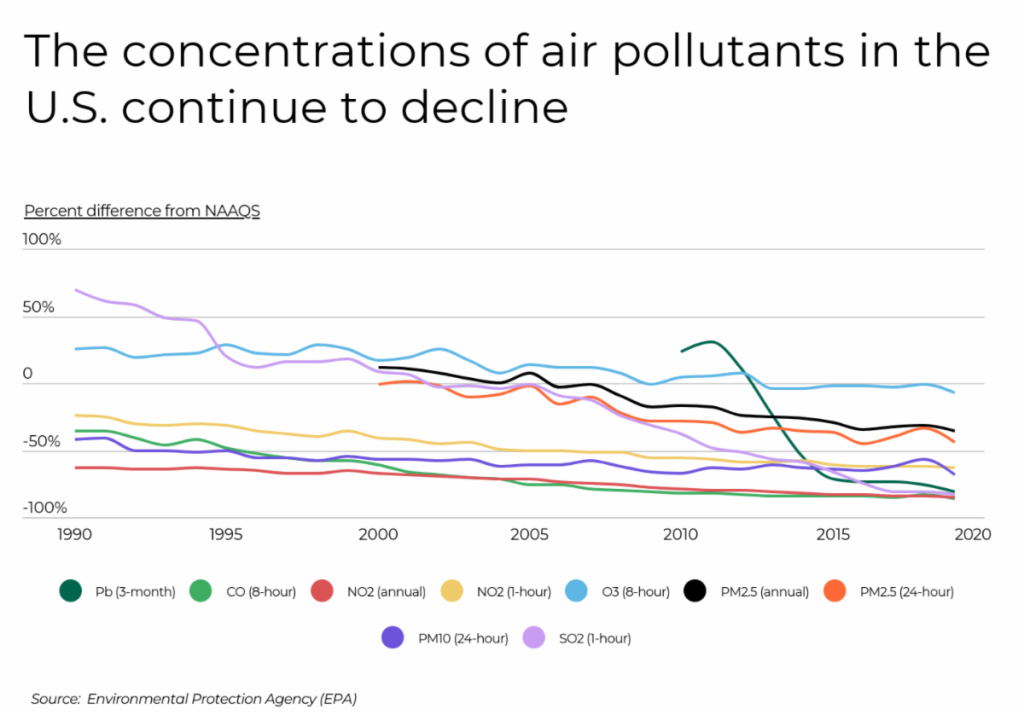Charlotte’s Air Quality Is Improving More Than Other Similar Cities
How does Charlotte’s air quality stack up compared to other large US cities? Pretty good actually. Charlotte has actually seen the 3rd biggest improvement in air quality among large U.S. metros. A new report from Filterbuy looks at the U.S. metropolitan areas that experienced the biggest improvement in air quality—as measured by AQI—from 2019 to 2020.
Air quality is a significant issue for both environmental and human health. In the environment, air pollution negatively affects soil and water quality through smog and acid rain, harming animals and plant life. The latter effects can have consequences for humans by disrupting crop yields and other sources of food, but air pollution can also have direct effects on human health by contributing to risks like asthma, emphysema, and cardiovascular disease. Recent evidence suggests that COVID-19 shutdowns in 2020 had a positive but short-lived effect on air quality. Researchers ranked metropolitan areas according to the percentage change in median AQI from 2019 to 2020.
From 2019 to 2020, the Charlotte metropolitan area experienced a 14.3% decline in median AQI, which means Charlotte had better air quality in 2020 overall. Out of all large U.S. metros, Charlotte experienced the 3rd biggest improvement in air quality from 2019 to 2020.

While public attention on the environment has recently focused on the acceleration of global climate change, another important and closely related issue is air quality. Climate change and air pollution share many of the same causes, with reliance on fossil fuels for energy and transportation being a major contributor to both. And the two phenomena also impact and reinforce one another: climate-driven events like wildfires can increase the volume of air pollutants including particulate matter, while the emission of pollutants like ozone increases the atmosphere’s capacity to retain heat.
Fortunately, while the effect of climate change remains a worrying trend for air quality, data from the Environmental Protection Agency shows that the concentration of air pollutants has shown a steep decline over the past few decades. Much of this decline can be attributed to stricter pollution regulations that were first created with the enactment of the Clean Air Act in the 1970s and amended in the 1990s.
Recent evidence suggests that COVID-19 shutdowns in 2020 also had a positive but short-lived effect on air quality. When large parts of economic and social life worldwide halted at the beginning of the pandemic, there was a sharp drop-off in major sources of pollution like industrial production and vehicle usage. This meant that the atmosphere saw a temporary reduction in emissions of pollutants.
U.S. data also confirms that there were major changes in air quality in many parts of the country during the first year of the COVID-19 pandemic. Cities that had fewer people driving and less industrial activity saw lower levels of pollution. As a result, many cities across the country saw improvements in air quality, both in terms of Air Quality Index (AQI)—an overall assessment of air pollution levels—and in the number of days with good air quality based on AQI measurements.
To determine the locations with the biggest improvement in air quality during COVID-19, researchers at Filterbuy used data from the U.S. Environmental Protection Agency to calculate the percentage change in median AQI from 2019 to 2020. Locations with the larger decrease in median AQI were ranked higher. In the event of a tie, the median AQI for 2020 and 2019 were used, with lower values being ranked higher. Researchers also calculated the percentage of days each year in which the air quality was considered to be good, defined as having an AQI below 50.
The analysis found that from 2019 to 2020, the Charlotte metropolitan area experienced a 14.3% decline in median AQI, which means Charlotte had better air quality in 2020 overall. Out of all large U.S. metros, Charlotte experienced the 3rd biggest improvement in air quality from 2019 to 2020. Here is a summary of the data for the Charlotte-Concord-Gastonia, NC-SC metro area:
- Percentage change in median AQI (2019-2020): -14.3%
- Median AQI (2020): 42
- Median AQI (2019): 49
- Percentage of days with good air quality (2020): 77.0%
- Percentage of days with good air quality (2019): 54.8%
Large Metros With the Biggest Improvement in Air Quality
For more information, a detailed methodology, and complete results, you can find the original report on Filterbuy’s website: https://filterbuy.com/resources/improving-air-quality-in-cities/

